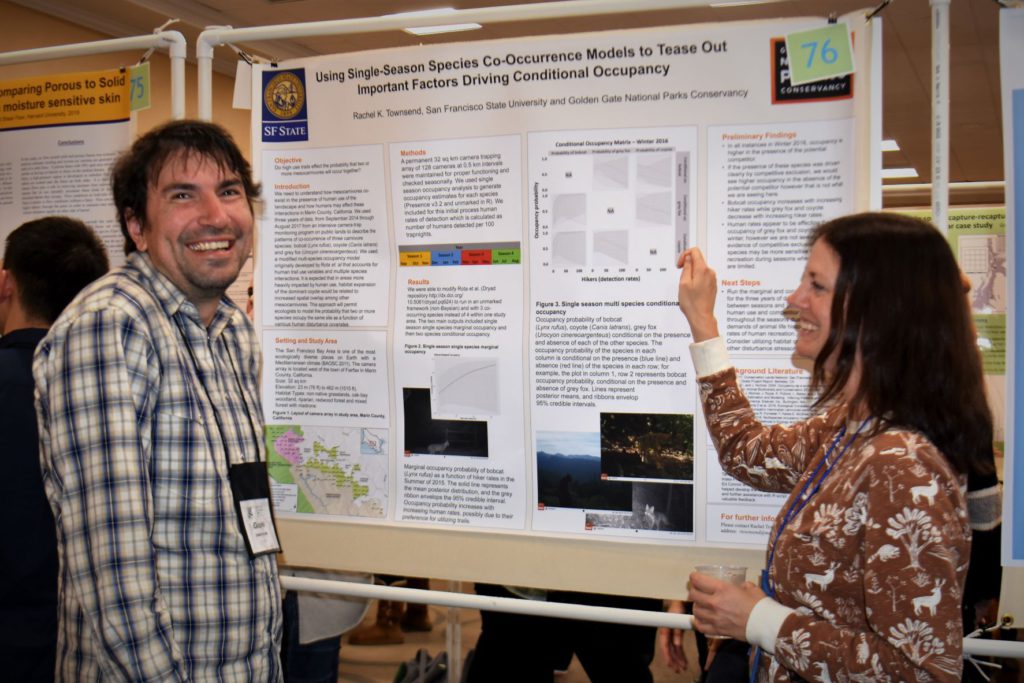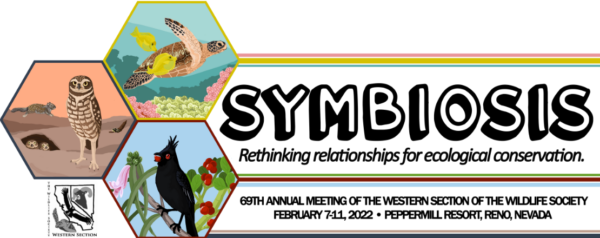A Student’s Guide to Navigating the Annual Meeting of the Western Section of The Wildlife Society

Attending a professional wildlife conference is a great way to share information among peers — specifically to learn about how wildlife work is done, see who is doing the work, and note who is funding the work. Most professionals cite “networking” as their primary reason for attending. For students, attending an annual conference provides a valuable opportunity to meet peers, interact with prospective employers or graduate research advisors, and hear directly from researchers. We’ve prepared information to help you prepare to make the most from your conference attendance and hope you find it helpful.
We have scheduled many workshops at the upcoming Annual Meeting which are geared towards students at all different stages of their education. We will have Career Recruiters, Resume Workshops, Job Interview Workshops, a Student-Professional Mentoring Game, plus the opportunity for extensive networking with professionals. Students are encouraged to apply for Travel Scholarships.
- REGISTER EARLY! Sometimes your university will require paperwork to miss classes, and your college may have funds available to help you attend conferences. In addition to the main conference, register for the welcome reception and consider attending the awards banquet as well; make networking a priority, and plan to shake a few hands!
- VOLUNTEER to help with the conference and you may receive a partial or full rebate on your registration fee! Click link for: More information on application process for Student and Early Career Professional Volunteers Positions
- Prepare to NETWORK! Print basic business cards with contact information and interests – essential items include your name, school affiliation, course of study with anticipated graduation date, phone number, and e-mail. List broad interests, for instance, “Interests include Game-bird Management”, or more specific interests like, “Seeking technician job doing point-count surveys, vegetation mapping, bat acoustics” or “Looking to begin Graduate School in Conservation Ecology or Wildlife Management.” Compile, update, or revise your resume and a sample cover letter. Include all employment, volunteer, and educational experience. Bring 10 or more hard copies of your resume to hand out – save one to use and evaluate in the Resume Workshop. Bring a digital copy on your laptop or USB in case you need to print extra copies.
- Make TRAVEL PLANS as soon as possible. Book your hotel room early. A credit card may be required when you make a reservation, but you are not charged until check-in. Consider sharing a room with students from your school and bring sleeping bags to make sharing easier – call the hotel and ask about beds, in-room couches, or rollaway beds. Check with your local chapter or section for possible travel grants. Attending conferences doesn’t have to break the bank. Try to ride-share or carpool to save resources. Join the Conference Social Networking site and check discussion boards for posts on ride and room shares. Through your local Chapter, contact professionals in your region, or contact your Student Chapter officers to see if they can connect you with somebody else going to the conference.
- ATTIRE – You will potentially meet prospective employers and graduate school faculty at the meeting. Bring decent “business-casual clothes,” which may include your school sweatshirt and jeans – but leave the jeans with holes in the knees at home. Remember that this is casual attire, but should not be sloppy or overly revealing. Don’t forget comfortable shoes – you may be on your feet a fair bit during receptions and breaks. Include a small computer-sized bag or portfolio clipboard with your business cards, resume, and room for personal items like a water bottle or coffee mug so that you don’t have to use paper cups or plastic water bottles during the conference. Bring pens, highlighter, small notebook, and post-it notes for organizing your conference program booklet and taking notes.
- PACK like a Wildlifer! Bring binoculars and field guides; you never know when you will encounter wildlife! Consider visiting a wildlife area on the way to or from the conference site. Save money by bringing a cooler with basic sandwich fixings, snacks, and drinks. Bring zip lock bags and make use of the hotel ice machine! The in-room coffee maker will give you unlimited hot water (think instant soup!)
- DRAFT A CONFERENCE ITINERARY based on your interests. Visit the conference website, and peruse the program and any announcements. Note specific talks you’d like to attend and any speakers/professionals you’d like to meet. Let your advisor(s) know that you’d like to meet these folks and see if s/he can help make an introduction.
AT THE CONFERENCE
- REGISTER! Find the Meeting Registration Desk (look for signs inside the hotel or conference center) and pick-up registration materials, if pre-registered or register as soon as you arrive. Double-check your registration to see that all the events you signed up for are included in your receipt and are indicated on your name badge. Wear your name badge anytime you leave your room! Take a moment to read through the program booklet. Highlight which sessions and events you want to attend. Realize that you probably can’t do it all, but prioritize which talks you want to see; have a few back-up ideas in case of cancellations, and look for “schedule change” sheets at the conference site or in your packet.
- Visit the STUDENT ACTIVITIES TABLE, where you can find out what specific activities are planned for students and get advice on how to get the most out of the conference.
- Concurrent Sessions – These are presentations on scientific research. Look for a talk or session theme that interests you and attend. It is fine to attend a talk in one session, then leave before the next talk starts to go to another talk in a different session.
- Welcome Reception – This is your first opportunity to meet new associates and catch up with those you already know. Come ready to chat it up with professionals who are eager to help you find a job! Think ahead of time about the questions you have for different wildlife employers.
- Poster Session – Printed research presentations, with photos and graphs, provide ample time to digest and learn more details and usually have a set time when the author is standing with his or her poster. This is also a great first step for getting ideas on how you’d present your own research.
- Chapter Meetings – Each chapter (regional group of wildlifers) meets to discuss past and future business, including planning upcoming activities for the chapter. Attend in your current area or an area of interest to you, and meet wildlifers who live and WORK nearby.
- Plenary Session – Leaders in our profession presenting around a common theme and may have a panel discussion and question/answer portion.
- Resume Workshop – Work with an experienced career counselor to learn the basics of drafting a new, or improving an existing, resume and cover letter.
- Workshops, Symposia, field trips and other events are sometimes scheduled either before or after the conference (topics vary from year to year). These can provide a great opportunity to learn and meet like-minded people, and the post-conference events usually fit into the student schedule.
- TALKING TO PROFESSIONALS: Don’t wait for a professional to find you. Simply introduce yourself and let them know you liked their talk or research. If they are talking with somebody else, wait until their conversation is finished and then step up. If they don’t immediately engage in conversation, just let them know that you would be interested in working with them in the future if an opportunity arises; then hand them your card. Ask what method is best to contact them after the conference and find out more about any upcoming research or job opportunities they may have. Feel free to ask any participant at the meeting “Where do you work,” “Where’d you go to college,” and any number of similar questions. If you want to find someone who specializes in the study of a specific habitat, species, or species group (e.g. horned lizards), just ask around. Look at the “I (HEART)…” buttons of other participants and strike up a conversation. Note ribbons or other indicators for Board Members, student mentors, speakers and other categories and those folks are good “ambassadors” for helping you find events or people you’re interested in. Remember that social events are networking opportunities; enjoy a beer or two if you are of legal drinking age, but be responsible and professional! You don’t want to be remembered for the wrong reasons.
POST-CONFERENCE
- FOLLOW UP WITH CONTACTS via e-mail; do not text them unless they specifically invited you to do so! Keep your message short and to the point, and compose it as a letter. Spelling errors or texting shorthand will stick out (in a negative way) so keep it simple, yet formal. Re-state where you met them and why you are interested in their work; and give them your contact information and the best time to contact you.
- SHARE YOUR EXPERIENCE. If you received a travel grant, scholarship, or even just a heads-up assistance that enabled you to attend the conference then let that group or individual hear about it after you return! Chapters may be interested in hearing from you directly during a board meeting or social, and advisors or school officials who helped you arrange scheduling to attend the conference will want to know that you went, what your experience was like, how others might improve the process of attending, and whether you’d recommend the experience to others. It never hurts to send a written thank you note or a thoughtful e-mail at the very least.
- If you file itemized income-tax returns and your costs of attendance are deductible (check tax regulations), or you plan to apply for a travel grant, KEEP YOUR RECEIPTS for registration, lodging, transportation costs, and food organized in an envelope or binder clip.
